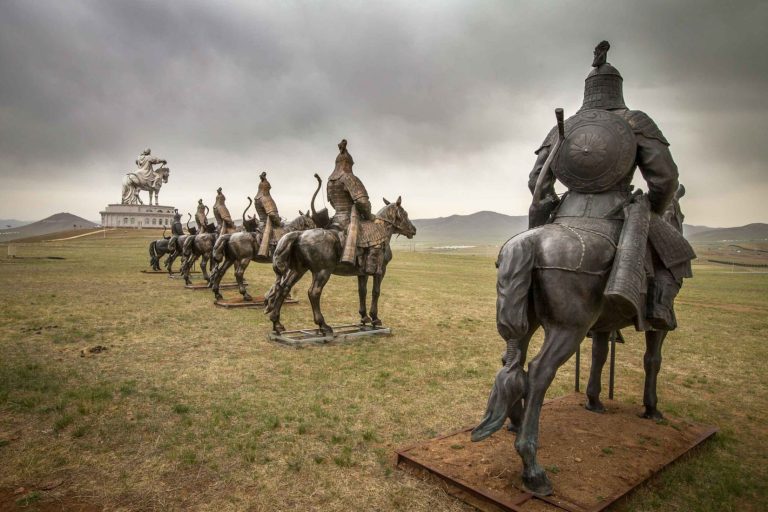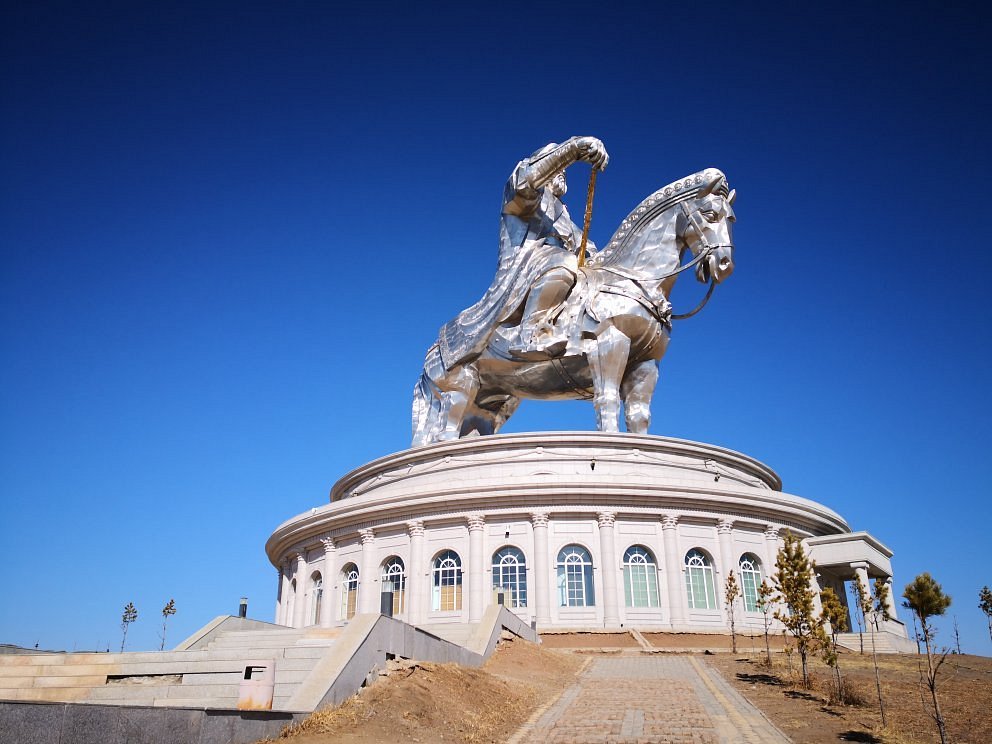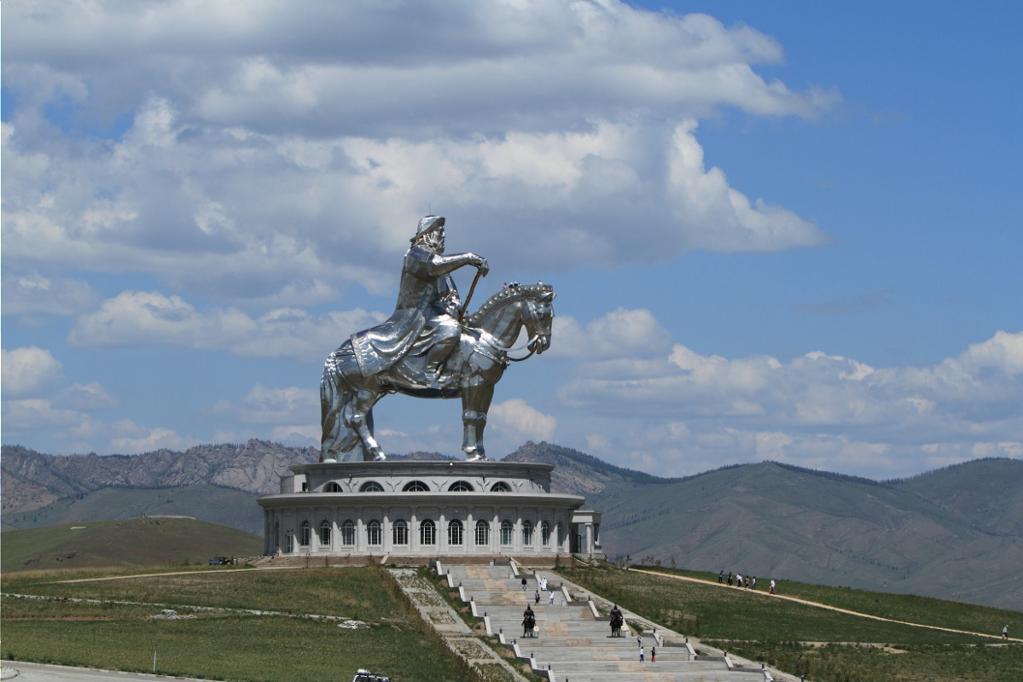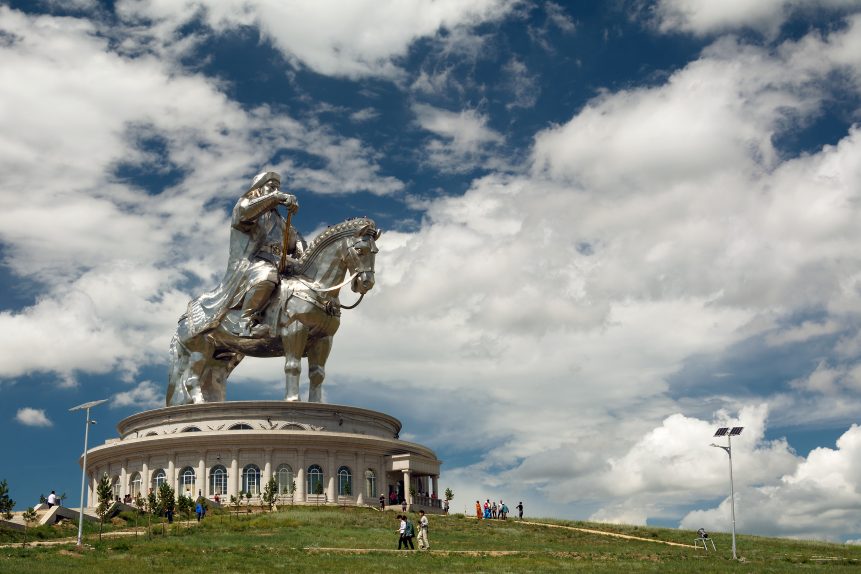
Statue of Chinggis Khan in Mongolia Mongolia Tours
The monument is comprised of a 98-foot-tall (30 m) statue of Genghis Khan on horseback and a 33-foot-tall (10 m) circular base. The Genghis Khan Statue is the tallest equestrian statue in the world (the term refers to a mounted horseman). The 131-foot-tall statue lies 33 miles (54 km) southeast of Mongolia's capital, Ulaanbaatar, in an area.

Genghis Khan Statue Complex (Ulán Bator) Lo que se debe saber antes de viajar Tripadvisor
In 2008, a gigantic statue of Genghis Khan riding on horseback was erected on the bank of the Tuul River at Tsonjin Boldog, 54 km east of the Mongolian capital Ulaanbaatar, where according to legend, he found a golden whip. The statue is 40 meters tall and wrapped in 250 tons of gleaming stainless steel. It stands on top of the Genghis Khan.

Genghis Khan Rides Again Huge Statue of Emperor Dominates the Mongolian Steppe Kuriositas
The Genghis Khan Statue complex cost was said to have exceeded 4.5 million USD although as the site seems still not completed, it will likely be more. The project was paid for by the Genco Tourism Bureau, a Mongolian company owned by the now Mongolian President Khaltmaagiin Battulga. Battulga named the company after a character and company from.

Blog Luxury Travel Packages & Solutions Statue, Ulaanbaatar, Equestrian statue
The Genghis Khan Equestrian Statue, part of the Genghis Khan Statue Complex, is a 40-metre tall, stainless steel statue of Genghis Khan on horseback and the world's tallest equestrian statue. It is located on the bank of the Tuul River at Tsonjin Boldog, 54 km east of the Mongolian capital Ulaanbaatar, where, according to legend, he found a golden whip.

Statue équestre de Gengis Khan Guide touristique de la Mongolie
by Alan Beaufour. published on 22 September 2019. Download Full Size Image. This 40 meter (131 foot) tall equestrian statue of Genghis Khan (r. 1206-1227 CE) was erected in 2008 CE. The statue stands on top of the Genghis Khan Statue Complex, on the bank of the Tuul River near Ulaanbaatar, the capital of Mongolia. Remove Ads.

Statue équestre de Gengis Khan Guide touristique de la Mongolie
The giant statue of Genghis Khan is impressive, and you can even go inside the horse and climb the steps before coming out to a panoramic view of the surrounding fields and nature. However, to go inside there is an entrance fee of 6,000 Tugrik ($2.50). After paying the entrance fee, you can walk around the mini-museum and see the giant boot.

Enorme estátua de Genghis Khan na Mongólia Genghis khan, Estátua, Estátua equestre
Discover Genghis Khan Statue Complex in Ulaanbaatar, Mongolia: Enormous statue of the Emperor of the Mongols.

Tour del Parco Nazionale di GorkhiTerelj + Statua Gengis Khan, Ulan Bator
The Genghis Khan Equestian Statue. The impressive statue is part of a larger complex and rises 40 meters or 130 feet tall. It is constructed out of stainless steel and depicts the Great Khan on horseback. Today it is the world's tallest equestrian statue and is around 54 kilometers or 33 miles east of the capital city of Ulaanbaatar.

Statue de Gengis Khan Statue, Croisiere, Voyage
Genghis Khan Statue Complex. Mongolia's largest statue of a man riding a horse - the statue of Chinggis Khaan (1162-1227) holding a golden whip in his right hand and staring off into the distance was created at the Tsonjin Boldog site, which is associated with many historic events. The site is located in Erdene soum, Tov aimag.

Genghis Khan statue on the bank of the Tuul River in Mongolia Statue, Equestrian statue
The Genghis Khan Equestrian Statue, part of the Genghis Khan Statue Complex, is a 40-metre (130 ft) tall, stainless steel statue of Genghis Khan on horseback and the world's tallest equestrian statue. It is located on the bank of the Tuul River at Tsonjin Boldog, 54 km (33.55 mi) east of the Mongolian capital Ulaanbaatar, where, according to legend, he found a golden whip.

Gengis khan equestrian statue Mongolia Travel Guide Horseback Mongolia
The Genghis Khan Statue, also known as "Chinggis Khaan" in Mongolia, is not just a mere work of art but a testament to the enduring legacy of a man who once ruled the largest empire in history. Commissioned in 2008 to commemorate the 800th anniversary of Genghis Khan's unification of the Mongolian tribes, the statue is a tribute fit for a.

Pin on Places
Chinggis Khaan Statute complex is situated 54 km from Ulaanbaatar City, with the view of beautiful natural scenery on the bank of the Tuul River, a historical place where Chinggis khan's golden whip was found. Today, for a memory of the man of the millennium, a 40 meters high stainless steel statue of Chinggis Khaan on a horseback is the.

Genghis Khan Equestrian Statue Mongolia Travel Guide Koryo Tours
Illustration. by Fanghong. published on 16 September 2019. Download Full Size Image. The monument of Genghis Khan (c. 1162/67-1227 CE), ruler and founder of the Mongol Empire (1206-1368 CE). (Hohhot, Inner Mongolia, China) Remove Ads. Advertisement.

Statue de Gengis Khan, Mongolie 5 raisons d'aller l'admirer
Chinggis Khaan Statute complex is situated 54 km from Ulaanbaatar City, with the view of beautiful natural scenery on the bank of the Tuul River, a historical place where Chinggis khan's golden whip was found. Today, for a memory of the man of the millennium, a 40 meters high stainless steel statue of Chinggis Khaan on a horseback is the.

Enormous Statue of Genghis Khan in Mongolia Amusing
From series "The Most Grandiose Statues and Monuments". Year: 2008. Height: 40 meters. In Tsonjin-Boldog region of Mongolia one can see the world's largest equestrian statue, the monument to Genghis Khan. Its height, excluding a pedestal, is 40 meters. The monument was opened in 2008. The sculpture is complemented with 36 columns that.

Genghis Khan Equestrian Statue Copyrightfree photo (by M. Vorel) LibreShot
Genghis Khan (born Temüjin; c. 1162 - 25 August 1227), also romanised as Chinggis Khan, was the founder and first khan of the Mongol Empire, which he ruled from 1206 until his death in 1227; it later became the largest contiguous empire in history. After spending most of his life uniting the Mongol tribes, he launched a series of military campaigns, conquering large parts of China and.